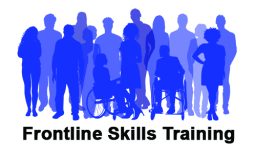
Mental Capacity Act Training
Three course options: Mental Capacity Power Hour, Mental Capacity Awareness for Frontline Staff and Mental Capacity Skills for Managers
Delivered by a qualified IMCA, our Mental Capacity Act Training offers all you need to make sure your staff understand their responsibilities when it comes to the Mental Capacity Act.
Mental Capacity Act Power Hour
Find out what the Mental Capacity Act is, explore the Five Principles and what they mean in your organisation.
Level 1- Mental Capacity Awareness for Frontline Staff
Building on the Power Hour, we'll explore the legislation around the Mental Capacity Act, we'll look at the Five Principles in more detail. We'll also cover mental capacity assessments, and some practical hands on experience on how these work. We'll touch on best interests and other related legislation.
Level 2- Mental Capacity Skills for Managers
This one day course includes everything we cover in Awareness but goes further to upskill managers in completion of Mental Capacity Assessments and making Best Interest Decisions.
Trauma Informed Practice
From the trauma power hour to two day in-depth courses
Power Hour
Our trauma power hour introduces your teams to some key ideas around trauma; how it affects children and young people, and how it presents in adults.
Top takeaways will include an understanding of how trauma impacts the brain and behaviour, and how to have a trauma informed conversation.
Trauma Awareness
Our Level 1 half day course builds on the Power Hour. We talk about different effects of trauma; from a neurobiological, mental and physical health perspective to how it impacts on mental health and every day actions and behaviours.
Trauma awareness gives your teams an understanding of how trauma can affect individuals, and the right and wrong things to do to create safe spaces.
Trauma Informed Services
Trauma Informed Services is a one day course which looks at a wide range of challenges that are impacted by trauma.
From understanding how the effects trauma can have and how it can affect individuals, to looking at conditions that offer present in trauma experienced people, to considering how your services may be causing further trauma, and how to make sure that your teams are offering psychologically safe, trauma informed services.
This will be a practical course that helps your teams really consider their roles in making your services trauma informed and gives them practical actions to take away to truly develop their approach to working with those who have experienced trauma.
Trauma Informed Organisations
Our trauma informed organisation course looks at the research around what makes a trauma informed organisation.
As well as education around trauma, and it's effects on individuals, we'll look at how you can audit your organisation to identify how trauma informed it is, and how you can develop and improve your trauma informed approaches.
We'll look at everything from leadership, through to policies and procedures, environment and user involvement.
This will be a practical course that helps your organisation really consider how you can make sure what you offer your client group does not cause further trauma or harm, and provides a psychologically safe space.
Why not team this course with Trauma Informed Services for a two day course which fully prepares you to become trauma informed, and be confident in sharing this with your client group?





Neurodiversity, Autism and ADHD Power Hours/Lunch and Learns
Give your teams a quick boost in awareness
We offer three power hours to help your teams understand neurodivergence: Neurodiversity, Autism and ADHD
Top takeaways for Neurodiversity will include the difference between neurodiversity and neurodivergence, key neurodivergent conditions and ways to be more inclusive.
For our Autism power hour we'll be covering a lot around language and environment.
In our ADHD power hour we'll be dispelling some myths and stigma around ADHD and building awareness on the condition.

Neurodiversity Awareness
Create an awareness of different neurodivergent conditions
This course is about building your team's awareness of different neurodevelopmental conditions that you might encounter with the people you work with.
“Neurodiversity is a natural and valuable form of human diversity." Quote from National Symposium on Neurodiversity.
Explore how autism, dyslexia, ADHD, dyspraxia and sensory processing disorder, to name a few, affect children, young people and adults, and explore steps you can take to make your services and environments neurodivergent friendly.
Understand the difference between neurodiversity and neurodivergence and when each one should be used.
This course can be tailored to the services you offer; whether education, community based, social care, health or something else.
Neurodiversity in the Workplace
Understand how to create neurodiverse workplaces where everyone can thrive
Our one day course helps managers, team leaders and supervisors to really explore how neurodivergence affects the teams they manage, and how they can create workplaces where neurodiverse teams can thrive.
We'll explore different conditions, how they might present, the challenges this might bring for managers, and how managers can sensitively and proactively explore actions they can take to support their neurodivergent team members.
We'll explore what reasonable adjustments are out there already such as Access to Work, and simple changes Managers can make to reduce difficulties for people in their teams.
We'll also think about how managers can become leaders in reducing stigma and promote a positive neurodiverse culture that makes the organisation a great place to work for everyone.


Managing Behaviour that Challenges
Half day course that builds skills and confidence
This half day course will explore some of the reasons people may be challenging in phone calls, and in person, alongside a range of techniques that people can use to manage these challenging conversations.
Part of this training will be some skills practice in these techniques so people can feel more confident in using them.
This is a very practical course that asks teams to really explore how they can make changes to reduce behaviour that challenges as well as build confidence in being able to set strong boundaries around behaviour that challenges.
Case Recording
Develop good quality case recording within your teams
This half day course will look at case recording, and the different elements that make up a good case record.
We will consider defensible documentation that stands up under scrutiny, alongside the importance of keeping objective, non -judgemental records about clients, and by the end of the course your teams will be able to understand why it is important to keep detailed case notes, and have some ideas on how to improve their case recording.


Getting the most out of supervision
Being a Manager can be stressful at times, with lots of busy responsibilities and requirements.
Often Manager are promoted because they are good at their jobs, but the human skills around good people interaction need a bit of development.
One of the key places to build good staff relationships is from within the supervision meeting.
On this half day course for Managers, Team Leaders and supervisors we will explore what a good supervision should look like, how to build rapport and understanding with your team members, and how to have difficult, but supportive, conversations with your employees.
We need your consent to load the translations
We use a third-party service to translate the website content that may collect data about your activity. Please review the details in the privacy policy and accept the service to view the translations.

